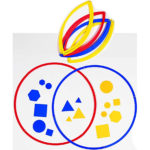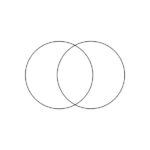Sorting Circles
Remember when you were in middle school or high school and your teacher asked you to create a Venn Diagram to sort out attributes that were either shared or not shared? You drew two large overlapping circles on a piece of paper like this…
You then sorted the attributes into 3 categories; shared attributes, attributes of the first idea/item, and attributes if the second idea/item.
The list might have looked something like this.
|
The House of Representatives There are 435 Members Members are elected for 4 year terms
|
Shared Attributes The are both elected They are both from each state
|
The Senate There are 50 Members Members are elected for 6 year terms |
You then transferred that information into your Venn Diagram to create a graphic organizer of your ideas.
These sorting circles work in exactly the same way except that young children are sorting attributes that are easy to see and describe. These allow children to consider one aspect of a concept or item at a time, which is age-appropriate but will be challenging when they attempt to consider the shared attributes.
 You can see how children put all of the blue items in one circle and all of the yellow items in the other. In the shared portion, they have put all of the triangles. Many will argue that the blue triangles should go with the blue items, and the yellow triangles should go with the yellow items. This is the challenge. I wouldn’t expect children under 5 to be able to complete this task completely on their own but experience and opportunity will help support them as they explore the idea of “shared attributes”.
You can see how children put all of the blue items in one circle and all of the yellow items in the other. In the shared portion, they have put all of the triangles. Many will argue that the blue triangles should go with the blue items, and the yellow triangles should go with the yellow items. This is the challenge. I wouldn’t expect children under 5 to be able to complete this task completely on their own but experience and opportunity will help support them as they explore the idea of “shared attributes”.
